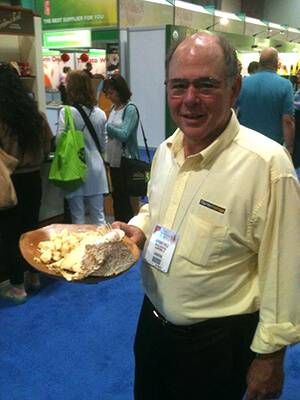Second Career: Join the Craft Foods Movement
How these three went artisanal after 50 and you can, too
The popular image of today’s artisan-food producer is a bearded, hoodie-wearing Millennial and his tattooed partner operating out of a Brooklyn warehouse. But here’s the reality: The locally sourced cheese, meat, beer and baked goods you enjoy might have been created or distributed by a boomer turning a passion into a second-career business in unretirement. These craft food enterprises are often family affairs, too.
The savory characters are profiting from a tasty, growing trend. “There is a shift in the culture,” says Kieran Folliard, the 60-year-old founder of the Food Building in Minneapolis, home to local artisanal producers. “There’s a movement back towards, and getting value from, craft production.”
Howard "The Cheese Man" Field
One member of this mushrooming movement: Howard “The Cheese Man” Field, 61, founder of Farm Fromage.
In 2010, Field was marketing fuel oil to homeowners around bucolic Lancaster County, Pa. (also known as Amish country). But sales were slow, and his employer let him go. “Thank God,” he says. “Two hours later, I came home and told my wife I was going into the cheese business.”
The switch wasn’t as surprising as it sounds. Field loves to cook and in February 2010, while snowed in, he decided to follow a cheese-making recipe to pass the time. That led him to imagine himself as an amateur home-based cheesemaker — until he followed a small handwritten “goat milk for sale” sign on the side of the road in Lancaster and met Amos Miller, the Amish owner of a goat dairy and cheesemaker.

That encounter led Field to instead start Farm Fromage, putting his marketing skill to use to sell cheese created by the region’s Amish, Mennonite and English farmers; Miller became his first customer.
Says Field: “I saw that there was an opportunity to help us get good food and to help the small family farm get more money for their milk and hard work.”
Field now works with about 10 family farms and sells 35 cheeses. His wife lost her job as a bank teller last year, so she’s his business partner.
Field markets the artisan cheese at venues including farmers markets, farm-to-table restaurants, craft fairs and online.
What about retirement, I wondered? “We have no choice but to work,” Field replied (partly the price of gladly putting four daughters through college). “But we love what we’re doing so much that we’d do it anyway.”
Merit Shalett: From Arts Center to Salad Greens
Merit Shalett’s story echoes and reinforces Field’s journey. She worked for two decades as associate director of the Contemporary Arts Center New Orleans. After a new director came in about three years ago, Shalett felt it was time to try something new.
Last year, at 61, she joined her 31-year-old son and her husband at Faubourg Farms, a sustainable straw bale urban farming operation specializing in hardy greens like kale, arugula and pak choi. (The produce is grown in straw bales that naturally feeds the plants and decomposes.) “We’ve always valued good food,” says Shalett. A popular item: “Mom’s Dressing,” made from Shalett’s vinaigrette recipe using local ingredients, especially Meyer lemons.
Ben Logan: Making a Culinary School Dream Come True
Then there’s Ben Logan, 60, founder of Carolina Artisan Bread in Midland, N.C. When he was 17, Logan told his parents he wanted to go to culinary school. “It didn’t go over well,” he chuckles. So Logan went to a traditional college and worked in the construction business for the next 30 years until it cratered during the housing bust.
A longtime amateur baker, Logan fondly recalled his culinary school dream and enrolled in the Baking and Pastry Arts program at the Art Institute of Charlotte. After finishing, he apprenticed with an 85-year-old master French baker and In June, 2013, opened Carolina Artisan Bread; two years ago, his wife, Cheryl, joined in. The bakery is housed in a renovated building on their property.
“People are interested in local products, hand-made products,” Logan says. “And we also use a lot of local flour.”
Logan's journey also illustrates that it isn't easy making money in the craft foods business. He needs about $9,000 a month to break even. Fortunately, his wholesale business is up and he had two profitable months in 2015. By March of this year, Logan expects to be steadily profitable. But that money will eventually fund a new location to bake bread, with enough space to sell retail.
In a sense, it’s hardly surprising that boomers are embracing the craft food business in unretirement. They often have the resources and the experience to start a small food or beverage venture. Plus, if you’ve spent your career head down in a cubicle or on the road, the idea of whipping up artisan foods and drink can be enticing.
“The whole craft movement is interesting and fun,” says Liz Williams, founder of the Southern Food & Beverage Museum in New Orleans.
The "Hot Dog Stand" Effect
There’s one more reason why I believe more boomers will be drawn into the craft food industry: The “hot dog stand” effect.
I met the “Hot Dog Man” at a square in downtown Boulder, Colo., in the late 1990s. A rakish, charismatic guy, he was doing a brisk business selling franks from his cart. He told me that, while growing up in Chicago, he dreamed of owning a hot dog stand. But he ended up working for Anheuser-Busch, ultimately owning a piece of a beer distributorship before retiring at 57. That’s when he took some savings and finally opened that hot dog stand. "Everybody always has a hot dog stand in the back of their mind,” he told me.
Risks and Rewards
Now we come to the point in an article like this when I need to list the dangers associated with starting a business in your 50s or 60s, artisan or not. Like, don’t put your retirement savings at risk. And apprentice first to see if you truly want to turn your passion into a profession. How do you do that? Ask.
Let's say you're intrigued by the notion of becoming a baker. Visit the artisan bakers in your area. Ask if you can apprentice with them or if they know someone who takes apprentices. Craft-bakers-to-be also can seek out information at sites like ones from the San Francisco Baking Institute and the Bread Bakers Guild of America.
Not a baker, but an aspiring brewer? The small scale craft beer business has largely been built on the exertions of future brewers putting in time at an existing start-up to learn the ropes. If that’s you, you could also check out the main craft brewers trade group, the Brewers Association.
Here’s an additional advantage of an apprenticeship: Most boomers want part-time or flexible work in their unretirement. But everyone I talked to for this story was definitely putting in more than a 40-hour workweek. Although the craft business may be fun, it’s also time-consuming.
Incubators are another way to learn about running a business. They offer fledgling entrepreneurs mentors, teach small business 101 and information about local funding sources. The International Business Innovation Association has a list of state incubation association, as well as wealth of other information.
Learning the business basics is critical. Otherwise, you might find your romantic vision turns into a financial heartbreak.
All true. And yet… If you take proper precautions and have a thirst (as well as a business plan, a marketing vision and financial discipline), go for it! Reduce your risks by tapping into training and educational resources from artisanal industry trade groups and craft-based incubators.
Like Field, Shalett and Logan, you may find a way to have some fun and help pay the bills, too.


